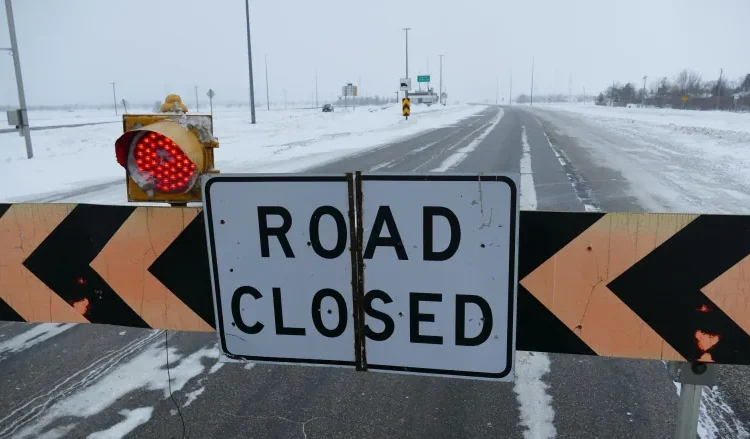People could face fines of $2,000 to $5,000 for driving on closed highways under bill introduced Tuesday
Before the first snowflakes fall in Manitoba, the government introduced a new bill which would see people slapped with a fine if they ignore highway closures due to bad weather conditions, flooding or construction.
Infrastructure and Transportation Minister Doyle Piwniuk introduced Bill 46, also known as the Highway Traffic Amendment Act, during question period at the Manitoba Legislature on Tuesday.
The minister cited an accident that took place west of Virden, Man., over the winter after a heavy snowfall.
“There was an accident because of a semi-truck driver that wasn’t supposed to be on the highway and it overturned one of our plow trucks,” Piwniuk told reporters after question period.
“We want to make sure that people stay off the highways when they’re actually closed because the fact is, it puts everybody else at risk, especially our first responders.”

In May, another instance of a person disobeying road closures led to an urgent call to RCMP.
A 21-year-old driver had to be rescued from his sinking car after ignoring barricades and driving into a flooded area just north of St. Adolphe, Man.
Officers and firefighters found the car and rescued the man, but he was slapped with a $237 fine under the Highway Traffic Act for disobeying the barricades.

If passed, those found in violation of the new law could be on the hook for a fine for at least 10 times that charge — between $2,000 and $5,000, the bill says.
The new law would prohibit people from driving on closed highways — unless they are driving an emergency vehicle, operating infrastructure equipment or authorized by a police officer.
The legislation would also hold accountable whoever causes or permits a vehicle to be on the road when its closed. For instance, the employer of a truck driver could be held liable for the driver using a closed highway.
Piwniuk said this legislation comes after the RCMP raised a number of concerns about the “dangerous behaviour that puts lives at risk,” he said.
RCMP spokesperson Sgt. Paul Manaigre said police don’t keep track of the number of people who drive on closed highways because there is no specific criminal offence for it at this time.
“Currently officers would have to examine other sections of the Highway Traffic Act that may fit the situation such as imprudent driving, careless driving or perhaps even dangerous driving under the Criminal Code,” he said in an email.
Manaigre said there were a few times over the winter when there were numerous road closures and people disobeyed emergency orders.
“It may not be a fine that you will see being issued often, but it is a tool that we can use to hopefully get the message across that the practice of ignoring the road closure notice can be dangerous and now comes with a high cost,” he said.


